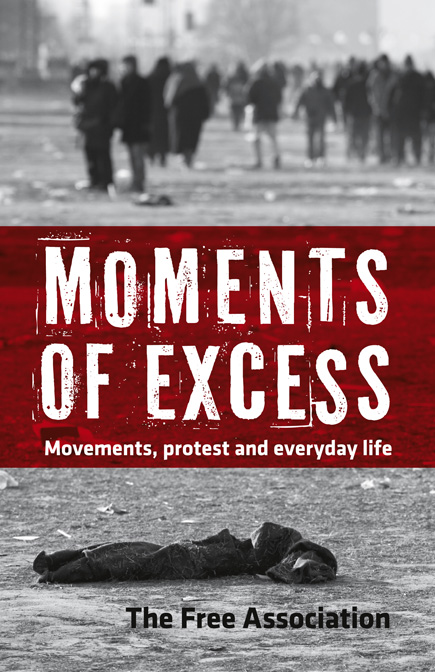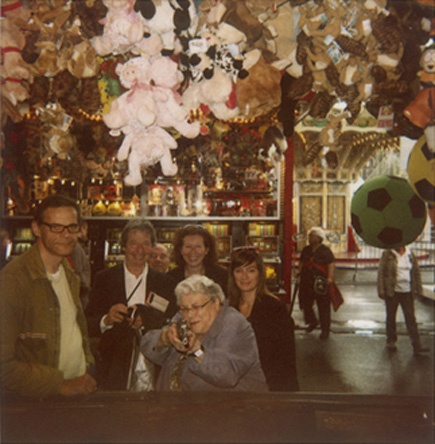 In a recent blog post asking why some forms of action resonate and others don’t, Brian dismissed the idea that there is ‘some magic pixie-dust that will guarantee success’. He’s right of course but perhaps we shouldn’t dismiss pixie-dust too quickly. In fact during our collective discussions the Free Association has frequently toyed with the prospect of a materialist analysis of pixie-dust (née fairy-dust). It’s one of our favourite riffs.
In a recent blog post asking why some forms of action resonate and others don’t, Brian dismissed the idea that there is ‘some magic pixie-dust that will guarantee success’. He’s right of course but perhaps we shouldn’t dismiss pixie-dust too quickly. In fact during our collective discussions the Free Association has frequently toyed with the prospect of a materialist analysis of pixie-dust (née fairy-dust). It’s one of our favourite riffs.
The roots of the riff lie in the annals of pop history, more specifically, in a famous bootleg tape of the Troggs (a popular beat combo, m’lud) having a hilariously sweary argument at a recording session. The sound engineer, who failed to press stop on the tape player, captured a band trying desperately to grasp what turns any particular song into a hit record. The conclusion reached is legend: “You got to put a little bit of fucking fairy-dust over the bastard.”
Since the introduction of this story into our discussions we have used fairy-dust as a stand-in for the element of chance in political action. There must be a limit point for analysis when we are seeking to go beyond what seems possible. Perhaps the Troggs were channeling a wider point about the process of creation. After all if we shift the register from pop music to revolutionary political analysis, the problem of the elusive hit record could read something like: ‘how do isolated acts of resistance gel to become mass rebellions? And what conditions make them more likely to succeed (even if only for a short time)?’
I always thought fairy-dust was just a nice metaphor; I liked it because it contained pop music and swearing, but reading a new book called “Capitalist Sorcery” makes me think there may be a more substantial concept in it. In fact the book, of which I’ve only scratched the surface, argues for the utility of certain ‘supernatural’ concepts in moments that make us question what we had previously taken as ‘natural’. Of course we are talking about a materialist reading of the ‘supernatural’: “There is a tendency to put everything into the same bag and to tie it up and label it ‘supernatural’. What then gets understood as ‘supernatural’ is whatever escapes the explanations we judge ‘natural’, those making an appeal to processes and mechanisms that are supposed to arise from ‘nature’ or ‘society’” (Pignarre, Stengers 2011: 39).[1]
This seems like a useful way into the political problems of the current situation because the economic crisis, which began in 2007, has severely dented belief in the ‘naturalness’ of the neoliberal world-view. Indeed the series of revolts that have followed, from Athens to London, from Tunis to Cairo, have allowed us to glimpse a different, re-potentialised world. Is this a glimpse of the ‘‘supernatural’? Of course neoliberalism isn’t dead, its current zombie state seems stubbornly persistent. Meanwhile our political and media elites continue to broadcast from within the old worldview, as though such events never happened. The introduction to Capitalist Sorcery describes this last point nicely: “Politicians within the parliamentary-democratic system (or its near equivalents) are entirely caught up in the logic of killing politics [a logic we can] associate with capitalism. It is a logic that aims to ‘naturalise’ – and hence automate and de-politicise – political decisions.”
Isn’t this the logic that is justifying austerity? The political possibilities opened up by the crisis have been disappeared behind a veil of apparent necessity. The mantra of neoliberalism remains the same: There Is No Alternative. We have to smash this mask of naturalness, to show that these decisions are political and that there are many other possible forms of social organization. This is, however, far from a simple task. Politicians (and indeed the rest of us) are not the freely choosing agents presupposed by liberal ideology. They are caught up in this logic of killing politics and even if they wanted to escape it they simply wouldn’t know how. Marx and Engels captured this point when they channeled Faust in the Communist Manifesto: “Modern bourgeois society is… like the sorcerer who is no longer able to control the powers of the nether world whom he has called up by his spells.” Capitalism isn’t just greed; nor is it reducible to the nefarious plans of individual capitalists or politicians. It is a set of logics that we are all caught up in, a series of abstract dynamics that have been summoned forth but which, during their operation, come to appear as natural and eternal. Isn’t this what we might understand as Capitalist Sorcery?
We are all caught up in forces that we can’t quite get at. As we go about our everyday lives, as we go to work or to the shops, we presuppose, for instance, that money will be the basis of our interactions. Because we presuppose these things they seem beyond our control. Of course we also know that our interactions contain something in excess of capital, something human, but we are continually encouraged to discount this excess. Such dynamics are facets of capitalism but they are made worse by neoliberalism. As politicians impose competitive markets in ever more areas of life, as we are put into situations that force us to see others as competitors, as we repeat behaviours over and over, then it becomes harder to make out where capital ends and we begin. As the Gang of Four put it: ‘Each day seems like a natural fact.’ The paradox is that the effects of capital become hidden and ungraspable and yet they act concretely to limit our lives.
Anti-capitalist politics is about breaking with these limitations, it is about re-potentialising the world. However to most people, most of the time, anti-capitalist politics don’t quite make sense. The individual components might be sensible enough but as a whole it just doesn’t seem viable. It is, after all, an ‘unnatural’ position to take, so much in our everyday lives argues against it. Events and crises, however, put the continuation of our previous everyday lives into doubt. When the ‘naturalness’ of the current state of things begins to lose its grip then the space opens up for ‘supernatural’ solutions.
Despite the disappearance of the crisis behind the veil of necessity we still feel something changed in 2008. It is hard to make out what that something consists of; it has after all remained largely mute. With some analysis though we can begin to guess at its contours. The ‘natural’ state of things once seemed to promise an improved life, if not for us then at least for our children. Now that promise appears unviable and the ‘natural’ state of things seems more like a trap. If the path to what we currently understand as ‘the good life’ becomes blocked then we can come to doubt if it was such a ‘good life’ after all. This is why it has been so hard to make out the something that has changed; it is a change in the underlying structure of contemporary desire. What we once desired, and the mechanisms that produced those desires, have lost their coherence.
This means that new desires are being produced and with them new political possibilities. We can be sure of this because of the change in recent struggles. We have seen the unexpected resonance of previously minority ideas. We have seen the emergence of the kind of movements not seen for a generation. We have seen cascades of events that have broken forty-year stalemates. Yet we still don’t know how far the new possibilities go because they have not been given full expression. Only collective political action can do this and our task, if we have one, is to see if we can trigger it. The problem, of course, is that we also caught, to a greater or lesser extent, within the current sense of things. As such we, as anti-capitalist militants, are also sorcerers. We are trying to conjure up something beyond ourselves, something we can’t wholly know, something beyond the existing ‘natural’ limits of society; something ‘supernatural’. It is in conditions like these that concepts like fairy dust begin to make sense. Fairy dust invokes the need for a gamble, a roll of the dice, an experiment. For this we need to leave our safety zones. “’We don’t know’ thus makes us leave the safety of the regime of judgment for one of risk, the risk of failure that accompanies all creation,” (Pignarre, Stengers 2011: 39). This does involve the element of chance, however it is not a question of just trusting to luck. We might better think of the process of putting ‘a little bit of fucking fairy dust over the bastard’ as a kind of incantation that draws on past experience in order to exceed it. Even the Troggs knew that the path to fairy dust lies between knowledge and cliché. “I know that it needs strings, that I do know”.
Given this we can see the Milbank occupation as an invocation. That jubilant show of defiance as boots went through windows crystallised a new mood of militancy. By doing so it conjured up a movement no one was expecting. Yet that movement has stuttered as it has failed to generalise. Another example of actions sprinkled with fairy dust can be found with UK Uncut. Who could have predicted that occupations of Vodafone shops would resonate so widely and spread so virally? Was it the result of fortuitous circumstances? Or did the specifics of its incantations facilitate its spread?
UK Uncut certainly shows us some of the elements needed for a contemporary invocation of politics. Firstly it manages to capture a spreading desire to take part in direct action. There is a deeply felt need for a new collective, participatory politics to counter the parliamentary-democratic system’s killing of politics. Yet UK Uncut’s actions also spread because they are easily replicable. They have a low entry level. Taking part isn’t too difficult. It doesn’t require too much preparation or specialist knowledge. The risks involved are not too high. Secondly, although the actions contain a ‘supernatural’ element they also make immediate sense. The argument is instantly grasped: austerity is a political decision and not the result of a ‘law of nature’. It is a political decision not to tax corporations and the rich as rigorously as the rest of us. It is a political decision to impose the costs of the crisis onto the poorest of society and those who did least to cause it. The UK Uncut actions, and the police response they provoke, reveal some of the dynamics of capital that neoliberalism seeks to deny. They reveal, for example, that capital contains different and antagonistic interests and that politicians, the police and contemporary structures of power align themselves with certain interests and against others. It is a political decision to do so.
Yet there is a danger here. The actions must be instantly understandable but that means they can only push so far into the boundaries of what it is currently possible to say. They must by necessity still contain many of our societies hidden presuppositions to thought. If the actions don’t contain a dynamic that pushes further and generalizes wider then the movement risks collapsing fully into the sense of the old world. We are all too familiar with this. “Of course we’d love to tax the bankers”, says the government, “but if we did they’d simply move to Geneva.” The parliamentary-democratic system seeks to kill every revelation of a political decision with a new ‘naturalisation’.
Now we can make out the third necessary element of our incantations. Our forms of action must include mechanisms or moments that set the conditions for collective analysis. Perhaps they must build in spaces, physical and temporal, which can maintain collectivity while slowing down the level of intensity. We need that familiar rhythm between the high intensity of action and the cooler pace of discussion and analysis. Only by maintaining this rhythm can we push further through the dynamics of capital that limit our lives. In such conditions movements can change and adapt in order to generalise. During the student movement the occupations played something of this role but on their own they weren’t enough. For a movement to move it must exceed the conditions of its own emergence. While a small group might stumble across a workable incantation they must conjure up forces that make themselves redundant. The aim must be to make the mass its own analyst, to spread the potential for leadership across the whole of the collective body. After all if a Genie gives you three wishes then your last wish should always be for another three wishes.
[1] What makes this all the more appealing is that the book, which talks about Sorcery and the ‘supernatural’, is co-authored by Isabelle Stengers, eminent philosopher of science who co-wrote the best known book on complexity theory: “Order out of Chaos”.








